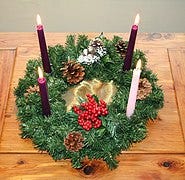We Should Save Christmas for Christmas
Commentary/Reflection
Every year, returning to school after Christmas vacation, I look forward to the opportunity to inflict a particular trauma on my students. What is this act of terrible trauma, or even child abuse? Do I assign a 10 page paper? Make them read text longer than a page length? Push-ups? No. Every year, after returning to school after Christmas break, I come to school wearing a… Christmas tie.
One might be surprised that such an act is regarded as so severe an offense, but such it is. Every year, I am sternly scolded: “Dr. D., Christmas is over, why are you still wearing a Christmas tie?” And I am forced to inform my confused students that Christmas is not over; rather, it has scarcely begun.
But, of course, while I have a little bit of fun at their expense, in fairness, it must be confessed that they are merely following the trends and tendencies of modern society. Christmas, as far as the stores are concerned, seems to begin earlier and earlier every year–at least after Halloween, and in some cases, even earlier. When I was young, Christmas music on the radio used to begin after Thanksgiving; it too now begins earlier. And if Christmas begins early, it ends early as well. As far as the business community is concerned, Christmas ends around 12pm on December 25. By December 26, we are well on to Valentines Day. So much for the 12 Days of Christmas.
The commercial Christmas season is, of course, driven by commercial reasons, namely the desire to extend the shopping season as early as possible and then, immediately after Christmas Day, to immediately pivot the consumers to buying overpriced chocolates, jewelry, and Valentines Day merchandise.
This early beginning and early ending of the Christmas season is deeply unfortunate. Most seriously, the season of Advent becomes lost in the commercial chaos. Modern society’s general inability to experience delayed gratification seems simply extended to the Christmas season. We don’t want to wait for Christmas.
And so we pass over Advent, to our greater poverty. Even in the Church, Advent sometimes seems to be too downplayed. Its penitential character is often forgotten about, with special fasts or mortifications rarely called for.
We should keep Advent, and save Christmas for Christmas. Advent serves as a wonderful season of preparation and reflection. It is a time to do penance, to clean out the muck in the “stables” of our hearts, and to prepare a home for Christ to come. As the great hymn, “People Look East,” announces, “Let us in our hearts prepare…”
In Advent, we reflect on the coming of Christ, not only at Christmas, but at the end of time. The readings in the Traditional Latin Mass stress the Second Coming, marking Advent not only as a time of preparation to meet Our Lord at Christmas, but at the Final Judgment. And this meeting rightly requires preparation.
“People Look East,” speaks of making “your house fair as you are able / trim the hearth and set the table.” But it speaks not only of our earthly homes, but of ourselves: “Let us in our hearts prepare / for Christ to come and enter there.” If we prepare our worldly homes for welcomed guests, we should prepare our hearts, our spiritual homes, for the most welcome Guest. We should prepare with fasting, increased prayers and devotions, works of penance, and spiritual reading.”
Erasing Advent short-circuits this time of preparation and robs of time to prepare our hearts for the coming Guest. That is why it is so important to observe Advent, anticipating Christ’s arrival with patience.

There are many ways we can do this. Keeping an Advent wreath in the home is an easy thing to do. Read Scripture daily, if you do not already. Join in the St. Andrew Christmas Novena.Learn and pray the Marian antiphon for the Advent and Christmas season, the Alma Redemptoris Mater. (My favorite translation is the one that begins, “Mother of Christ, hear Thou Thy people’s cry”).
More so, don’t set up Christmas decorations until Christmas Eve. The old tradition of trimming the Christmas tree on Christmas Eve is a perfectly good one, and there is no reason to do otherwise. If you do decorate, then fit your home with the liturgical color of violet (ribbons, candles, ornaments) in this coming week before Christmas, and save the most extravagant of your decorations for the Christmas season. Start celebrating Christmas on Christmas and keep doing it through the Christmas season… even if everyone else has moved on. The Church celebrates Christmas at least until the Baptism of the Lord in January–we should do no less!
And keep wearing the Christmas tie throughout the season. You might confuse a student or two. And who knows–you might even be able to teach them something.

